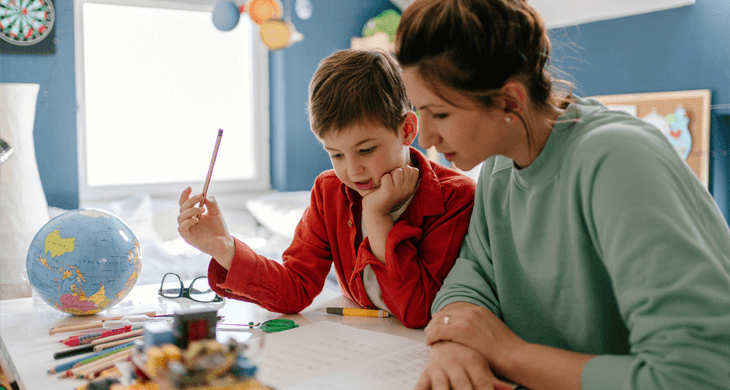With the arrival of summer, many parents fear the inevitable onset of summer learning loss, where students lose some of the skills and knowledge they gained while school was in session. This year, those fears have been worsened by a pandemic that has caused school closures and severe disruptions to learning routines. According to one study, researchers predict that students will return in the fall with learning losses that set them a full year behind where they would be during a typical school year.
This phenomenon, which is being referred to as the “COVID slide,” has many parents and educators scrambling to find ways to help students retain what they’ve learned in order to succeed in the fall. While the predictions are alarming, there are ways you can help your child combat the COVID slide in the coming months.
Encourage Your Child to Adopt a Growth Mindset
When I first began teaching ten years ago, I was struck by how many students already had firm beliefs about which subject areas they excelled in and which subjects they didn’t do well in. Using their grades as their primary data points, they would make broad assertions like, “I’ve always been bad at English.” This represents what Dr. Carol Dweck describes as a “fixed mindset.”
In the face of failure, many students with this mindset accept the fact that they will never be skilled in a certain area, which is what drives students to cheat or give up on a subject (or even school) altogether. Dr. Dweck suggests that students cultivate a growth mindset, which is as easy adding the word “yet” to any learning challenge. For example, a student might not be able to write a compelling argument essay yet, but that doesn’t mean the student is bad at English.
You can watch Dr. Dweck’s TED Talk where she describes the very real benefits of adopting a growth mindset and discussess whether your child has a growth or a fixed mindset. Try to see the summer months as an opportunity to learn and improve rather than a time where valuable learning will be lost.
Use a Student-Centered Approach
In the traditional classroom, the instructor takes center stage. The teacher assigns work that students complete independently, and the teacher delivers material while the students listen quietly. In recent years, some educational researchers have challenged this teacher-centered approach. Instead, they suggest a student-centered approach where students direct the course of their learning. Rather than providing your child with worksheets in areas you believe they need more support in, based on grades and test scores, encourage your child to assess their skills and then design their own projects to develop those skills.
For example, if they say that they aren’t skilled in the area of research, they could start by researching a topic they’re already experts in—themselves. When students reflect on their abilities and craft their own assignments to improve those abilities, they’re much more likely to be engaged in the learning process.
Make Concrete Learning Goals
One of the most common reasons that students fail to meet their goals is because the goals they make are too ambiguous. For example, a student might say they want to be better at math, which is a great goal in theory but not in practice. Instead, that student would be much more likely to achieve their goal if they said they wanted to master three different mathematical concepts and ace an online assessment of those concepts.
Not only can concrete goals help your child academically, they can also help them emotionally. Making concrete goals actually leads to a greater sense of satisfaction and higher levels of happiness. Sit down with your child and come up with a list of concrete learning goals for the summer. The goals should also be measurable and attainable.
Don’t Ignore Areas of Strength
Much of the language surrounding learning loss—even the term itself—is negative. Try not to lose sight of your child’s strengths over the summer. If your child is a voracious reader, you could keep a reading log posted somewhere visible so that everyone in your household can see the impressive amount of reading your child has done. Encouraging good learning habits is just as important as discouraging bad habits.
When you celebrate your child’s academic and social strengths, you help them improve their self-perception as students. Even if your child does not perform well in school, you can still encourage them by highlighting non-academic strengths like persevering in the face of adversity and keeping a positive attitude.
Create a Learning Community at Home
Mimicking the school environment at home can be tricky, especially for parents who are juggling work and family responsibilities. Luckily, there are plenty of resources available for parents to create a learning community at home by providing opportunities for self-directed learning. Creating a designated space for homeschooling can help your child think differently about the separation between their lives at school and their lives at home. Allow your child to personalize the space so that it feels like their own.
Showing students that learning can take place anywhere enables them to sit in the driver’s seat as they navigate the roads that make up their educational journeys. As Jack Hanna once said, “The world is the true classroom.”
Free learning resources, including a digital library of more than 17,000 eBooks and a personalized game-based learning platform, are available to all families at the K12 website. These resources will also help to engage your child while he continues to learn over the summer break. And, if you’re looking for an alternative to your traditional brick-and-mortar school, be sure to review the many school options available through K12. Additionally, check out a recent Northwest Evaluation Association (NWEA) study that shows how Stride K12-powered students outpace national averages in all grades for both math and reading this past year.



































